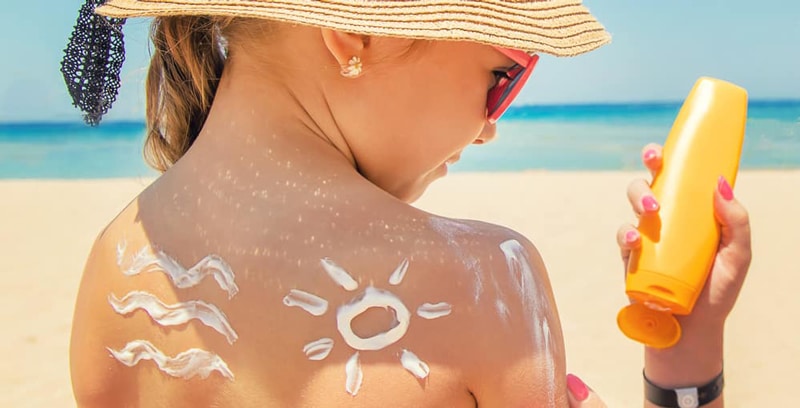
Sun protection is crucial to maintain healthy skin and prevent damage caused by harmful ultraviolet (UV) radiation. With the advancement in sun care products, one option that stands out is SPF 50. In this article, we will explore the benefits and significance of SPF 50 in providing advanced sun protection.
Sun exposure can lead to various skin issues, including sunburns, premature aging, and an increased risk of skin cancer. Therefore, it is essential to take proactive measures to shield your skin from the sun’s harmful rays. One effective way to do so is by using sunscreens with a high Sun Protection Factor (SPF), such as SPF 50.
Understanding SPF
SPF stands for Sun Protection Factor, which indicates the level of protection a sunscreen offers against UVB rays, the primary cause of sunburns. SPF 50 sunscreen provides a higher level of protection compared to lower SPF options.
SPF 50 works by extending the time it takes for your skin to burn when exposed to the sun. For example, if your unprotected skin starts to burn after 10 minutes, applying SPF 50 can potentially increase that time to 500 minutes, depending on various factors.
Benefits of SPF 50
- Higher level of protection: SPF 50 offers more protection against harmful UVB rays than lower SPF sunscreens. It helps minimize the risk of sunburns and related skin damage.
- Longer-lasting protection: SPF 50 provides prolonged sun protection compared to lower SPF alternatives. This is especially beneficial if you spend extended periods outdoors.
- Shielding against UVA and UVB rays: SPF 50 sunscreens also provide protection against UVA rays, which penetrate deeper into the skin and contribute to premature aging. By blocking both UVA and UVB rays, SPF 50 offers comprehensive sun protection.
Choosing the Right SPF 50 Product
When selecting an SPF 50 product, consider the following factors:
- Form: SPF 50 is available in various forms, such as lotions, creams, sprays, and sticks. Choose the one that suits your preferences and skin type and provides easy and convenient application.
- Skin type: Consider your skin type when choosing an SPF 50 product. Some formulations are specifically designed for sensitive skin or oily skin, while others offer added benefits like hydration or mattifying effects.
- Broad-spectrum protection: Ensure that the SPF 50 product you choose offers broad-spectrum protection, meaning it shields against both UVA and UVB rays. Look for labels that mention “broad-spectrum” or “UVA/UVB protection.”
- Reputation and reviews: Research and read reviews about different SPF 50 products to get an idea of their effectiveness, texture, and overall customer satisfaction. Recommendations from dermatologists or trusted sources can also guide you in making the right choice.
Here are a few recommended SPF 50 products available in the market:
- Brand X SPF 50 Sunscreen Lotion: A lightweight, non-greasy formula suitable for all skin types. It offers broad-spectrum protection and is water-resistant for up to 80 minutes.
- Brand Y SPF 50 Sunscreen Spray: A convenient spray-on sunscreen that provides even coverage and quick absorption. It is suitable for outdoor activities and offers long-lasting protection.
- Brand Z SPF 50 Facial Moisturizer: A moisturizing sunscreen specifically formulated for the face. It offers broad-spectrum protection, lightweight texture, and can be worn under makeup.
Remember, choosing the right SPF 50 product is crucial for effective sun protection. Consider your skin’s needs and preferences to find the product that works best for you.
Applying SPF 50 for Effective Sun Protection
While having an SPF 50 product is important, proper application is equally vital to ensure maximum sun protection. Here are some tips for applying SPF 50 effectively:
- Apply enough sunscreen: Use an adequate amount of SPF 50 sunscreen to cover all exposed areas of your body. As a general guideline, a shot glass-sized amount is recommended for the entire body. Don’t forget commonly overlooked areas like ears, neck, hands, and feet.
- Rub it in thoroughly: Massage the sunscreen into your skin until it is fully absorbed. This ensures even coverage and helps the product work effectively.
- Reapply frequently: Reapply SPF 50 sunscreen every two hours or more frequently if you are sweating heavily or swimming. Even water-resistant sunscreens can wear off over time, so it’s essential to maintain adequate protection.
- Pay attention to timing: Apply sunscreen at least 15-30 minutes before going outdoors to allow it to fully absorb into your skin. This ensures you are protected right from the start.
- Combine with other sun protection measures: Sunscreen alone is not enough to protect your skin entirely. Seek shade during peak sun hours, wear protective clothing, such as hats and sunglasses, and consider using umbrellas or sun shelters for added protection.
Remember, applying SPF 50 correctly and consistently is key to achieving optimal sun protection and minimizing the risk of sunburns and skin damage.
Sun Protection Beyond SPF 50
While SPF 50 offers advanced sun protection, there are additional measures you can take to enhance your sun safety. Consider the following:
-
- Seek shade: When the sun is at its strongest, typically between 10 a.m. and 4 p.m., find shade whenever possible. This reduces direct exposure to the sun’s rays and lowers the risk of sunburns.
- Wear protective clothing and accessories: Opt for loose-fitting, tightly woven clothing that covers your arms and legs. Don’t forget to wear a wide-brimmed hat to shield your face, neck, and ears. Sunglasses with UV protection are also essential to protect your eyes from harmful rays.
- Use lip balm with SPF: Lips are often exposed to the sun and can easily become dry and chapped. Protect them by using a lip balm with SPF 50 or higher.
- Stay hydrated: Keep yourself well-hydrated by drinking an adequate amount of water throughout the day. Hydrated skin is less prone to sun damage and can recover more quickly from sunburns.
Remember, sun protection goes beyond just relying on SPF 50. By combining different measures, you create layers of defense against the sun’s harmful rays and promote overall skin health.
Myth vs. Reality: SPF 50 and Sunburns
There are several misconceptions surrounding SPF 50 and its ability to prevent sunburns completely. Let’s address some of these myths and uncover the reality:
Myth: SPF 50 prevents sunburn completely.
Reality: While SPF 50 provides a high level of protection, it does not guarantee complete sunburn prevention. Factors like the intensity of the sun, time of exposure, and individual skin sensitivity can still contribute to sunburns. It’s important to use SPF 50 correctly and in combination with other sun protection measures.
Myth: Once I apply SPF 50, I’m protected all day.
Reality: Sunscreen, including SPF 50, gradually wears off over time due to factors like sweating, swimming, or towel drying. Reapplication every two hours, or more frequently if needed, is essential to maintain adequate protection throughout the day.
Myth: SPF 50 makes my skin immune to skin cancer.
Reality: While SPF 50 provides significant protection against UVB rays, it is not a foolproof defense against skin cancer. It’s crucial to practice overall sun safety, including seeking shade, wearing protective clothing, and regularly checking your skin for any changes or abnormalities.
Understanding the limitations of SPF 50 helps you make informed decisions about sun protection and take additional precautions when necessary.
Importance of SPF 50 for Different Skin Types
SPF 50 is beneficial for individuals with different skin types. Let’s explore its significance for various skin tones:
- SPF 50 for fair and sensitive skin: Fair skin is more susceptible to sunburns and skin damage. SPF 50 offers a higher level of protection, minimizing the risk of burns and reducing the chances of long-term damage like premature aging and skin cancer. Sensitive skin can also benefit from SPF 50 formulations designed to be gentle and non-irritating.
- SPF 50 for medium to dark skin tones: While individuals with darker skin tones have more natural protection against the sun due to higher melanin levels, they are still at risk of sun damage and skin cancer. SPF 50 helps provide an extra layer of defense and prevents harmful UV rays from penetrating the skin.
It’s important to note that regardless of skin tone, everyone should prioritize sun protection and use SPF 50 or higher sunscreen regularly.
The Future of Sun Protection
The field of sun protection continues to evolve, with ongoing research and advancements in technology. Here are some exciting developments and trends to look out for:
- Advances in sunscreen ingredients: Researchers are continually exploring new ingredients that offer enhanced protection and better skin compatibility. These innovations may lead to sunscreens with improved efficacy and reduced side effects.
- Smart sun protection devices: Technology is being integrated into sun protection products, with the emergence of smart wearables and apps that monitor UV exposure and provide personalized recommendations for sun safety.
- Sustainable sunscreens: The demand for eco-friendly and reef-safe sunscreens is growing. Researchers are working on developing formulations that provide effective sun protection while minimizing environmental impact.
As the understanding of sun protection deepens, we can expect further advancements to ensure better protection and healthier skin in the future.
Conclusion
Effective sun protection is essential for maintaining healthy skin and minimizing the risk of sun damage. SPF 50 offers advanced sun protection by providing a higher level of defense against harmful UVB and UVA rays. By understanding SPF, choosing the right SPF 50 product, and applying it correctly, you can ensure optimal sun protection.
However, it’s important to remember that SPF 50 is not a guarantee against sunburns or skin cancer. It should be used in conjunction with other sun protection measures, such as seeking shade, wearing protective clothing, and staying hydrated.
Different skin types can benefit from SPF 50, whether you have fair and sensitive skin or a medium to dark complexion. Sun protection is a priority for everyone, regardless of skin tone.
The future of sun protection looks promising, with ongoing research and advancements. From innovative sunscreen ingredients to smart sun protection devices, the aim is to provide better protection, improved compatibility, and sustainable solutions.
In conclusion, incorporating SPF 50 into your sun protection routine is a proactive step towards safeguarding your skin from the damaging effects of the sun. Remember to choose the right SPF 50 product, apply it correctly, and complement it with other sun safety practices. Prioritize your skin’s health, and enjoy the outdoors with confidence.
FAQs
1. Can I use SPF 50 on my face every day?
Yes, you can use SPF 50 on your face every day. In fact, it is highly recommended to protect your skin from harmful UV rays. Look for SPF 50 products specifically formulated for the face to ensure lightweight texture and compatibility with makeup.
2. Can I use SPF 50 sunscreen on my children?
Yes, SPF 50 sunscreen is safe for children. It is important to choose sunscreens specifically designed for children, as they are often formulated to be gentle on their delicate skin. Ensure thorough application and reapplication for maximum protection.
3. Should I still use SPF 50 on cloudy days?
Yes, you should use SPF 50 even on cloudy days. UV rays can penetrate through clouds, and unprotected skin is still at risk of sunburns and damage. Make SPF 50 a part of your daily skincare routine, regardless of the weather.
4. Can I use SPF 50 if I have oily skin?
Yes, there are SPF 50 products available that are suitable for oily skin. Look for oil-free or mattifying formulations that won’t clog your pores or contribute to excess shine. These products can provide sun protection without adding unwanted greasiness.
5. Can I use SPF 50 if I have acne-prone skin?
Yes, SPF 50 is safe to use on acne-prone skin. In fact, protecting your skin from the sun is crucial when dealing with acne, as some acne treatments can increase your skin’s sensitivity to UV rays. Look for non-comedogenic or oil-free SPF 50 products that won’t aggravate acne.
